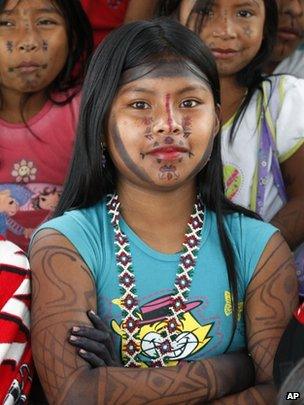Colombia apology for devastation in Amazon rubber boom
- Published

Many Colombian indigenous peoples are threatened by conflict between left-wing rebels and the army
Colombia's president has apologised to indigenous communities in the Amazon for deaths and destruction caused by the rubber boom around 100 years ago.
Backed by Colombia's government, a Peruvian firm tapped rubber from 1912 to 1929 near La Chorrera in the south.
Up 100,000 people were killed and communities devastated, according to indigenous leaders.
President Juan Manuel Santos asked for forgiveness "for all the dead and their orphans".
He apologised "in the name of a company, a government".
Mr Santos said that in pursuit of progress, the government of the day "failed to understand the importance of safeguarding each indigenous person and culture as an essential part of a society we now understand as multi-ethnic and multicultural."
Torture and mutilation
Rubber barons in the Amazon carried out horrendous human rights abuses, first documented by British diplomat Roger Casement in 1912.
These included forced labour, slavery, torture and mutilation, says the BBC's Arturo Wallace in Colombia.
The apology was issued on the day Latin Americans mark the beginning of Spanish colonisation.
The Day of the Race, as the date is known in the region, commemorates the arrival of Christopher Columbus on the continent on 12 October 1492.
The president named nine indigenous peoples who were decimated by the rubber-tapping project of Julio Cesar Arana, a controversial Peruvian entrepreneur and politician.
"It is essential to contribute towards healing the wounds inflicted on your lives and in the memory of our nation," he said.
President Santos vowed that such abuses would never happen again.
The Colombian government recognises 87 indigenous groups but the Colombian Indigenous Organisation, OIC says there are 102.
Up to one-third of them face extinction because of the armed conflict and forced displacement.
- Published10 July 2012
- Published18 November 2011
- Published27 October 2011